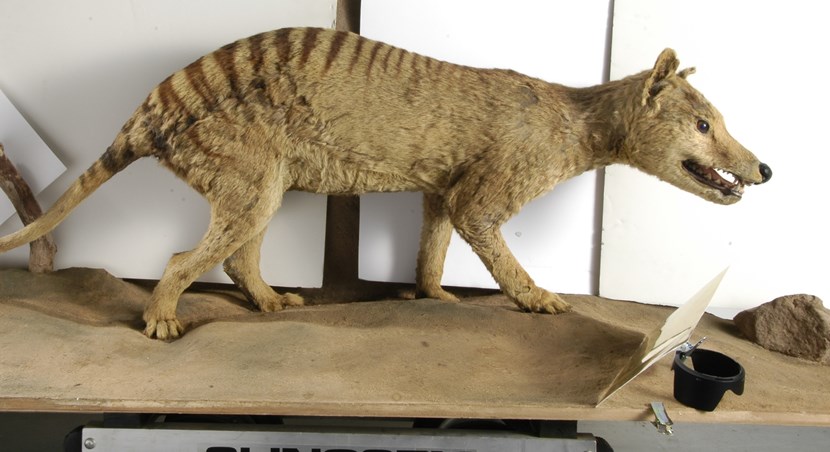
02 Oct 2017
Leeds specimens help solve mystery of Tasmanian tiger’s tale
It’s an enduring extinction mystery that has puzzled generations of scientists and naturalists from around the world.
Now an international research project may have finally solved the riddle of what happened to the enigmatic Tasmanian tiger- thanks to three specimens from Leeds Museums and Galleries collection.
Researchers from Australia have been painstakingly analysing DNA from the animals, which scientists call thylacines, taken from collections around the world in an effort to determine why the small, wolf-like marsupials vanished from the Australian mainland 3,000 years ago.
Among the animals tested by the team at the University of Adelaide were the three from Leeds, usually kept at Leeds Discovery Centre- the city’s state-of-the-art storage facility.
Along with 48 other specimens, they helped the experts determine that their extinction was most likely due to extreme weather and drought rather than wild dogs or hunting by Aborigines, as previously thought.
Clare Brown, Leeds Museums and Galleries curator of natural sciences, said: “It’s very exciting that specimens from our collection in Leeds have contributed to international research which has helped solve such a long-standing and captivating mystery.
“By learning more about what happened to animals which have become extinct, we can understand a great deal about how the world around us has changed over time and also how we can better protect important and endangered species today.
“We have a fantastic natural sciences and taxidermy collection in Leeds and we’re very proud that it’s played a part in the chapter of the thylacine’s captivating story.”
Tasmanian tigers, which carried their young in pouches like a kangaroo, became extinct from the Australian mainland around 3,000 years ago, surviving only in the island state of Tasmania.
Hundreds of unconfirmed sightings have since been reported in Tasmania and mainland Australia.
Many subsequent searches took place and in 1983, American media mogul Ted Turner offered a $100,000 reward for proof of the continued existence of the Tasmanian wolf, also known as the Tasmanian tiger or thylacine, but no definitive evidence has ever been found.
The Leeds collection includes an extremely well-preserved stuffed specimen shipped to Leeds from Australia in 1869 as well as five skulls in the collection.
Councillor Brian Selby, Leeds City Council’s lead member for museums and galleries, said: “Assisting such an important and complex investigation alongside international research partners is a real tribute to the skill and expertise of our team in Leeds, who work to preserve these historic specimens.
“We’re very fortunate to have such a fascinating and comprehensive collection which can teach us a great deal about the past, present and future of the natural world.”
Free public store tours of Leeds Discovery Centre are held every Thursday at 11am and 2pm. These can be booked by calling 0113 378 2100 or emailing discovery.centre@leeds.gov.uk
All other visits are by appointment only. The centre also offers group talks and tours led by curators and enquiries for these can be made to same contacts.
ENDS
For media enquiries contact:
Leeds City Council Communications team
communicationsteam@leeds.gov.uk